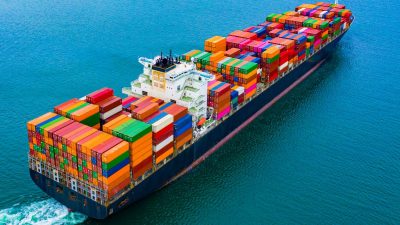Shipping company Hapag-Lloyd has made its entrance into the ultra-large container ship sphere with the introduction of Berlin Express. This new development signifies the largest container ship sailing under a German flag.
The Berlin Express boasts a capacity of 23,600 twenty-foot equivalent unit (TEU) and is the first in the company’s new Hamburg Express class. CEO Rolf Habben Jassen says with the new vessel introduction, Hapag-Lloyd is at a turning point. “The highly efficient ships will allow us to reduce our emissions immediately and to a very significant degree. At the same time, they are an important building block in our strategy to gradually push ahead with decarbonization. All the vessels in this class will sail under the German flag and thereby make an important contribution to strengthening Germany as a shipping hub.”
A new era of shipping at Hapag-Lloyd
Globally, shipping companies have been on a quest to curb CO2 emissions with the use of liquefied natural gas (LNG).
The Berlin Express marks a new era of shipping for Hapag-Lloyd. The company will have 12 state-of-the-art large container ships in its fleet by 2025. The latest fleet addition is in a class of its own. LNG will be used to power the vessel, which the company adds will reduce CO2 emissions by 25% and soot emissions by 95%. Hapag-Lloyd is on a mission to ensure its entire fleet operates environmentally friendly by 2045.
The new class ship was built at the Hanwha Ocean shipyard in South Korea and is almost 400 meters in length. Container ships in the Hamburg Express class will operate exclusively on the Far East route between Asia and Europe.
Rise in LNG shipping
In 2015, American shipping company TOTE Maritime launched the world’s first LNG vessel, Isa Bella.
Energy Monitor reports that there will be more LNG tankers than supertankers by 2028. “635 active LNG tankers are operating worldwide, around 100 of which launched in the past three years, shows data from GlobalData, Energy Monitor’s parent company. Such is the boom in LNG demand that energy companies have planned for a further 524 tankers, which would double the world’s total LNG carrying capacity, reads the report.
The LNG market has boomed in recent years. The European market has quadrupled in size, as countries look for a cleaner alternative to coal, and to limit their reliance on gas pipeline imports from Russia,” reads the report.
About the author
Sharl is a qualified journalist. He has over 10 years’ experience in the media industry, including positions as an editor of a magazine and Business Editor of a daily newspaper. Sharl also has experience in logistics specifically operations, where he worked with global food aid organisations distributing food into Africa. Sharl enjoys writing business stories and human interest pieces.











